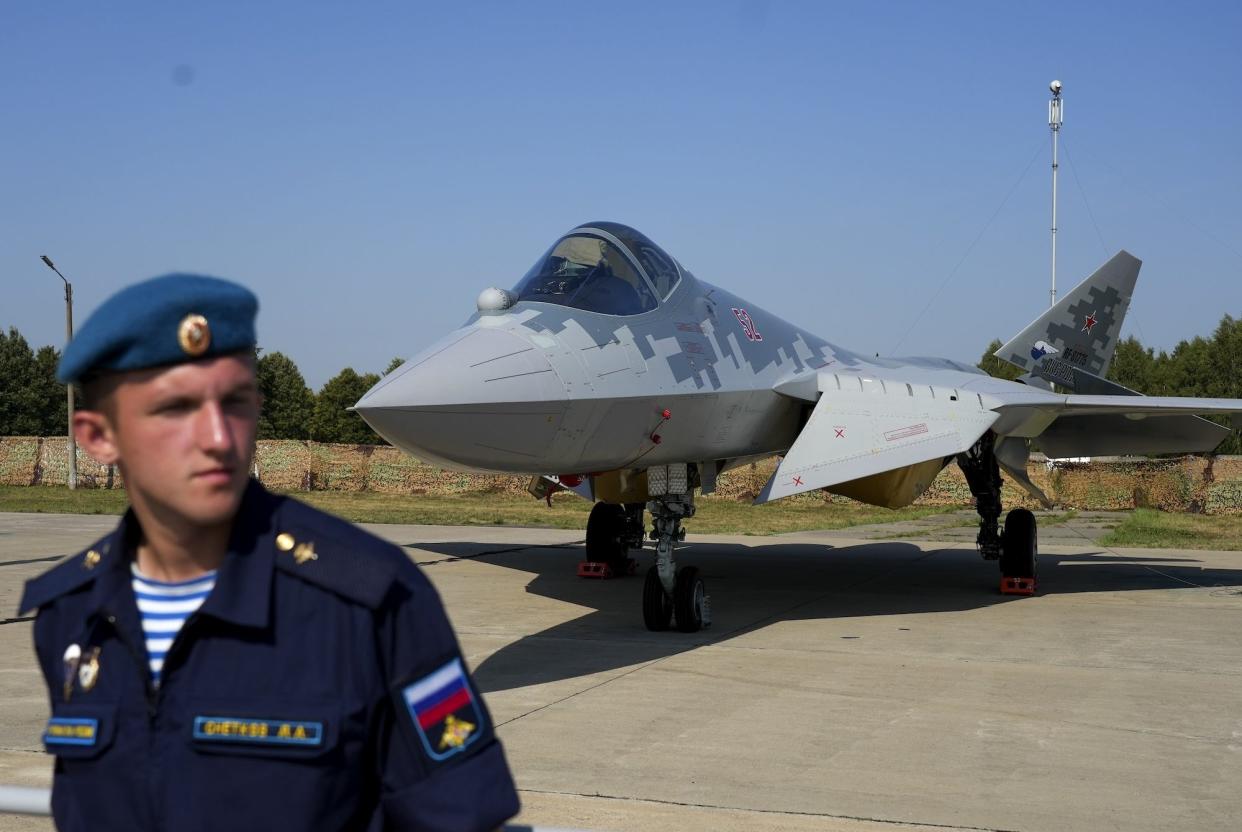Russia's talking about a 6th-generation fighter jet while its Su-57 sits out the Ukraine war

Russian officials have started discussing a future 6th-generation fighter aircraft.
But Russia has struggled to operate its 5th-gen fighter, the Su-57 that's been absent from Ukraine.
"This is an illusion," an expert on Russia's defense industry told BI.
Even as Russia's air force struggles to make a difference in Ukraine, the service and the country's aviation industry are discussing a next-generation fighter that will be deployed by 2050.
Not coincidentally, the discussion comes as the US Air Force hints that it may drop its plan for a sixth-generation fighter, a piloted air superiority fighter that will operate with drones. But experts consider the idea of a next-generation Russian fighter to be sheer fantasy at a time when it's struggling to operate its fifth-generation stealth fighters.
"This is an illusion," Pavel Luzin, an expert on the Russian defense industry, told Business Insider. "People in the government may even believe that it is possible, but it is not. It is absolute emptiness. Of course, the Russian design bureaus are imitating some research and development activity in this field and getting money for this imitation, but there is nothing serious."
Nonetheless, the topic is being discussed in Russian media, regime-controlled outlets that often try to stir nationalism by boasting about the superiority of Russian weapons. "Currently, we are thinking about the concept of a sixth-generation aircraft, conducting search research, exchanging views with military specialists," Evgeny Fedosov, scientific director of the State Research Institute of Aviation Systems, wrote in a column for the state-owned TASS news agency. "Such an aircraft should appear sometime by 2050, but already now it is necessary to understand what the armed conflicts of the future will be like."
Discussing cutting-edge aircraft seems almost surreal for Russia, whose air force has enough problems using its current warplanes in Ukraine. Russian airpower has played a marginal role in the Ukraine war, despite superior numbers and technology versus Ukraine's dwindling number of old Soviet-era jets. Russian airpower has mostly relied on fourth-generation aircraft such as the Su-30, Su-35 and Su-27, which are upgraded designs dating back to the 1980s. Russia's fifth-generation fighter, the Su-57, has been conspicuous by its absence in Ukraine. With only a dozen or so built, the Su-57 only recently made news when one or two were damaged by Ukrainian drone strikes on their airbases.
Yet Russia is one of the world's top aviation powers, with a massive research and manufacturing base left over from Soviet days. With America pursuing — if tentatively — its Next Generation Air Dominance project, and China developing a future jet, it would be peculiar if Russia wasn't contemplating its next fighter.
Like other nations, Russia must grapple with fundamental design questions. Does it make sense to build a manned fighter, with all the bulk, complexity and survivability that a human in the cockpit requires? Or opt for an AI-controlled aircraft, or perhaps a team where a manned jet works with drones? What sort of stealth features will it have, and will it be armed with traditional cannon and missiles, or laser weapons?
In November 2023, a senior Russian aviation official said that no decision had been made as to whether a sixth-generation fighter would be manned or unmanned. "Two years ago, a round table was organized at the Army on the issues of creating sixth-generation aviation complexes," Sergei Korotkov, a top designer at the state-owned United Aircraft Corporation, told TASS. "Both the military and institutes involved in aircraft construction were invited to the round table; specialists from the Moscow Institute and the United Aircraft Corporation were present. The result was that we, in fact, didn't agree."
Korotkov seemed certain that a next-generation jet would operate as a team with drones. He also said that the "further direction of long-term development of aviation technology is to increase flight performance, the ability to adapt with other combat control and engagement systems, high maneuverability, versatility, optimal piloting, and multi-mode use of the power plant."
Interestingly, Fedosov, the science director at the State Research Institute of Aviation Systems, suggested that modern jets are becoming too complex and expensive. "To go further according to the logic of complication is a vicious practice," he wrote. "And the larger and heavier the plane, the more expensive it is."
These are tough questions for any nation. But Russia must also confront issues that other nations don't. It would have to develop a cutting-edge jet while fighting an intense war in Ukraine that sucks up resources, and while international sanctions restrict imports of vital electronic components a future fighter will need.
Michael Peck is a defense writer whose work has appeared in Forbes, Defense News, Foreign Policy magazine, and other publications. He holds an MA in political science from Rutgers Univ. Follow him on Twitter and LinkedIn.
Read the original article on Business Insider

